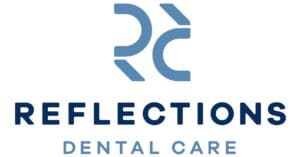Dental implants are the gold standard in replacing missing teeth with a permanent, natural-looking, and natural-feeling solution. The treatment is highly successful. But it is to be expected that a patient will have some discomfort following surgery. Many patients do experience low-grade to moderate pain that peaks within the first 48 hours and then gradually resolves in the ensuing week. This is true whether you are getting a single implant or All-on-4 dental implants in Oklahoma City, OK.
Understanding what it will be like and what you can do to take care of your recovery makes the healing process run more smoothly. The best part is that there is less pain to be endured when good care and pain management strategies are utilized. Healing is quicker too. Patients often ask us at Reflections Dental Care how to relieve pain from dental implant procedures to ensure a comfortable recovery. So, let’s dig into this topic!
Why Does Pain Happen after Dental Implant Surgery?
Post-implant pain is a result of the body reacting to the surgery. As an implant is placed, the specialist cuts through gum tissue and drills through bone to insert the implant. Naturally, this causes an inflammatory reaction as the body begins to heal.
Pain is usually a dull ache near where you have the implant, but some individuals experience throbbing pain after dental implants that can be more pronounced in the initial days. Bleeding, swelling, and soreness when biting are common too. Your body is simply protecting the area as new bone forms around the implant during osseointegration.
Instant Pain Relief Medication
Your dentist will probably prescribe pain medication to help you make it through the initial recovery period. Take the medication as directed, even if you don’t feel anything to start. It’s better to stay ahead of the pain than to try and catch up when it hurts more. Many professionals recommend the best pain relief after dental implants by combining prescribed medications and over-the-counter options.
Over-the-counter drugs like ibuprofen can be particularly helpful where the healing of dental implants takes place, since the drug helps minimize swelling in addition to relieving pain. Acetaminophen can also be helpful and can be taken with ibuprofen without any problem for maximum effect.
Cold Therapy and Resting
Application of cold compresses to the face will greatly alleviate pain and swelling. An ice pack wrapped in a thin towel should be applied every 15 to 20 minutes in the first 24 to 48 hours. Do not put ice on the skin, though, as this can create tissue damage.
Sleeping properly is also important to allow you to recover. Do not attempt activities that would stress the body for 72 hours after surgery because an increase in blood movement may increase the swelling and prolong the healing time. Sleep sitting up slightly to prevent the pooling of the blood close to the surgical site. These simple steps are among the best methods to address tooth pain after a dental implant in the early days post-surgery.
Long-Term Relief
Even though the original pain should gradually get better, there may be residual discomfort for several weeks. This may be managed in general by continued usage of over-the-counter pain medications and good oral hygiene.
Some symptoms, though, require immediate action on the part of an expert. Make sure to consult your dentist if you experience severe pain that persists after the third day, infection symptoms that include fever or pus, uncontrollable bleeding that won’t cease even when gentle pressure is used, or numbness that persists after a few hours.
Supporting Your Healing Progression
The post-operative surgery process after a dental implant is fairly straightforward if the instructions issued by your dentist are strictly adhered to. Pain is minimal and short-lived for the average patient, and improves considerably within a week.
Keep in mind that each patient heals differently, so don’t panic if your healing time is marginally different from the rest. Just ensure that you adhere to your post-op instructions, drug protocols, and gentle oral hygiene. Should you experience any difficulties or concerns when healing, be sure to reach out to Reflections Dental Care for advice and assurance.


